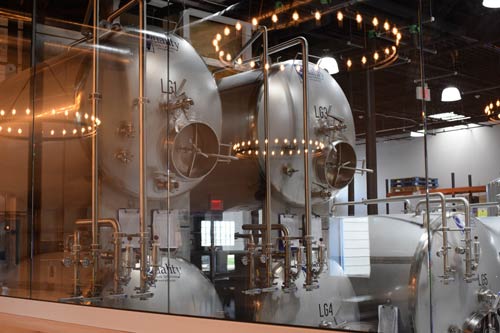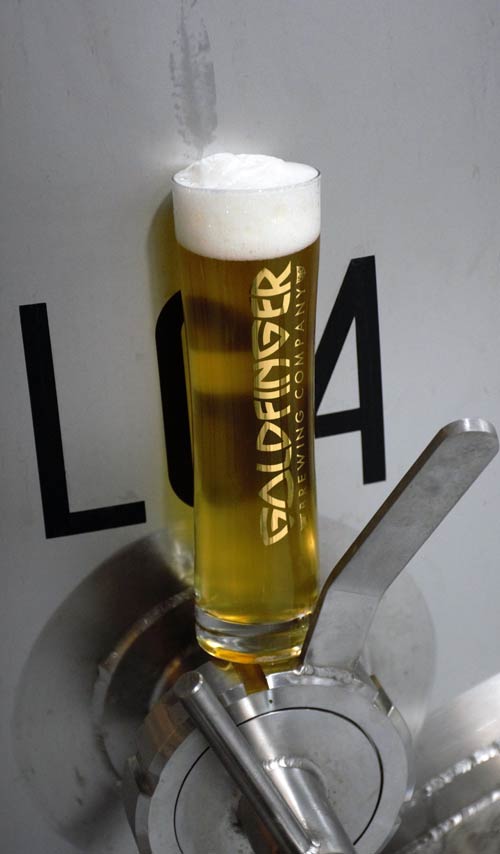Committed to “clean” beer, well beyond the glass
We are committed to reducing our carbon footprint by employing sustainable business practices wherever possible. While we have taken significant steps toward reducing the amount of waste we create, we are constantly seeking out other avenues by which we can work toward more “green” practices. Below you will find a list of several areas where we have made the conscious decision to reduce our waste.
We use less water
Beer is comprised of anywhere from 90-95% water, so evidently we need a to use a lot of it! Unfortunately, many smaller breweries struggle to keep their water consumption down due to the lack of more advanced technology that larger breweries use. While we aren’t large enough to warrant these technologies (most of them don’t even accommodate small breweries) we managed to discover a significant way for us to reduce our water usage. We installed three specially designed drains by Blucher (https://www.blucher.com/) that allow us to reduce the amount of water needed to wash down our brewery from the average 96 liters, to only 3.4 liters! Here’s a video to show you how it works: https://www.youtube.com/watch?v=sBcsejB_fgY
We reuse more carbon dioxide than we import
One of the primary natural byproducts of beer fermentation (aside from our beloved alcohol) is carbon dioxide. Our yeast releases almost three times more carbon dioxide naturally than we need for any of our other processes in the brewery. However, due to our small scale, no equipment currently exists that allows us to harvest the naturally produced co2 for use in other areas of our brewery. While we are actively working with companies on developing a carbon dioxide reclamation plant small enough to suit us, we have found other ways to reuse what we produce. Most smaller breweries allow the natural co2 to escape the tank, then blast processed co2 back into the beer before packaging to carbonate the beer using gas cylinders. We believe this is a wasteful practice (these cylinders have to be delivered on trucks that contribute to air pollution), especially since we have already produced the co2 ourselves. Instead, we close off our tanks to allow the naturally produced co2 to carbonate the beer using a special spunding valve (a valve that allows us to fine tune the level of carbonation in the beer). Not only are we reducing waste, but the added bonus is that these co2 bubbles are finer than ones that come from a processed gas cylinder, resulting in a smoother and softer drinking experience.
We recycle our spent grain
After every brew, we are left with a significant amount of organic material in the form of spent grain. This is the grain that is leftover after we extract the majority of its sugar to feed to our yeast, to make beer. We have partnered with local farmers and gardeners to reuse this spent grain, which is rich in nutrients, to use as compost and cattle feed.
We use phosphorous free chemicals
To produce clean beer, the brewery must be a sanitary environment. This requires the use of special chemicals that allow us to properly clean all our vessels. Unfortunately, many of the chemicals typically used in similar environments contain high levels of phosphorous. The phosphorous eventually makes its way into the Gulf of Mexico by way of the Mississippi river and acts as a nutrient for major algae growth (this is bad!). This is called a “dead zone” because the widespread algae growth depletes the ocean of its available oxygen and results in fish and other marine life death. Therefore, working with our chemical supplier, we use 100% phosphorous free chemicals in our brewery so we don’t contribute to “dead zones.”
We love our bats
We partnered with our friends at Half Acre Build Co to design a bat box that we hung up on our building. Bats are extremely effective at controlling insects, especially mosquitoes (they can eat up to 1,200 per hour!). They are also excellent natural nighttime pollinators as they fly through gardens eating insects and spreading pollen. Lastly, they help distribute plant seeds through their droppings helping to promote more plant and tree growth.
Our delivery van named “Lager Jogger (LJ)” uses Diesel fuel
While electric cargo vans continue to be under development and not widely available across the United States, we settled for the most environmentally conscious option available to us, while not negatively impacting our hauling ability. Diesel fuel emits 40% less carbon dioxide than gasoline. Despite diesel fuel containing more carbon in it than gasoline, today’s modern engines are much more efficient at converting the energy than gasoline engines, which results in less carbon emissions.
Current green project under development: We can help keep your lights on!
We are in discussions with the Downers Grove sanitary district on a process by which we provide them with additional brewery waste to put into their anaerobic digesters. This helps to produce methane for their combined heat and power (CHP) gas engine to produce electricity. That’s right, our beer production can help keep your lights on!
While we are proud of our current green practices, we have a long way to go and will continue to improve. If you have any suggestions, please email us at info@goldfingerbrewing.com.


